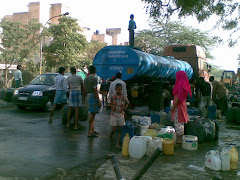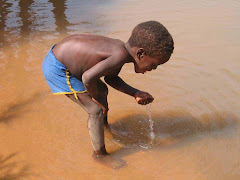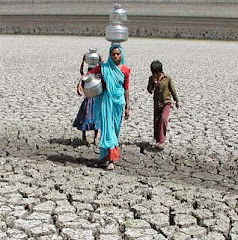Provision of water remains high on the agenda of former First Citizen of India.
Missle-man APJ Abdul Kalam has called upon people to launch a special initiative to provide safe drinking water for all and suggested that it be undertaken as a 'societal mission'.
Kalam, a scientist by profession spoke recently in Chennai on a topic that has gained global currency in recent years. He joins a growing list of water advocates.
Among Kalam's suggestions are creation of a connection between water bodies in each state across the country as the leading solution to the problems of scarcity; using scientific and technological developments to resolve the global problem of poor availability of clean drinking water, et al.
Kalam has been urging the scientific community to work along with and industries to find a solution to water problems that plague so many across the world.
On this count, he is bang on: technology holds the key to alleviate global water shortages. We have seen technological advancement lead to raising of life expectancy, tackling diseases that have killed millions in previous centuries, create a flat world and brought efficiencies in several areas of industrial production.
So, why not use technology to rescue many in the world from certain death?
Tuesday, January 25, 2011
Friday, January 14, 2011
Krishna water dispute verdict given; no end seen to feud though
This verdict has taken 40 years to be delivered, but, all the stakeholders are still not happy.
One of India's oldest and biggest inter-state river water disputes, involving sharing of the Krishna River water among the states of Maharashtra, Karnataka and Andhra Pradesh has ended after almost 43 years. The Krishna Tribunal, in its judgment recently, distributed the water among all three riparian states in the Deccan plateau .
But, the dispute seems to be over only on paper and has become even more politicized.
Soon after the verdict, which was delivered just before the new year, voices of discontent have started to emerge with Andhra Pradesh state government saying that it would likely file an appeal before the Tribunal as it was not satisfied with the verdict on sharing of surplus water with the other two neighbouring states.
The issue has united almost all political parties in Andhra Pradesh. The major concern is that the Brijesh Kumar Tribunal's permission to Karnataka to raise the height of Alamatti dam from 519 to 524.25 metres would affect kharif crop in over 13.5 lakh acres in rice-rich Krishna delta.
Andhra Pradesh Chief Minister N Kiran Kumar Reddy indicated the state would go for an appeal within the stipulated time against the issues that are not beneficial to the state.
The Tribunal in its award made a firm allocation of 1001 TMC FT of water to AP, an increase of 190 TMC FT than earlier. But, the state had to forego its sole right over utilisation of surplus water as the Tribunal made proportionate allocation to the other two states -- Maharashtra and Karnataka, as well in surplus water. This would deprive AP of use of 190 TMC FT of surplus water.
Also, the reduction in the share of surplus water will adversely affect several irrigation projects in the state. Andhra Pradesh was earlier allowed to use the entire surplus water but under the new tribunal, it has been distributed among three states.
The Tribunal has given Karnataka 911 TMC FT and Maharashtra 666 TMC FT.
Opposition parties of Andhra Pradesh had decided to protest against the Krishna River Water Disputes Tribunal's award in national Capital New Delhi on January 9 on sharing of river water between the states. The parties had adopted a resolution denouncing the permission granted to Karnataka for increasing the height of Alamatti dam from 519 meters to 524.25 meters, as it was detrimental to the interests of the lower riparian state.
The parties wanted the state to ensure that Andhra Pradesh alone got the sole right over utilisation of surplus water from river Krishna.
The parties have also decided to build people’s movement from the grass-root level to bring pressure on the federal government besides taking legal recourse to undo the injustice.
The judgment has taken over four decades to be delivered. I wonder how long it would now take to arrive at a complete solution to the problem of water sharing?
One of India's oldest and biggest inter-state river water disputes, involving sharing of the Krishna River water among the states of Maharashtra, Karnataka and Andhra Pradesh has ended after almost 43 years. The Krishna Tribunal, in its judgment recently, distributed the water among all three riparian states in the Deccan plateau .
But, the dispute seems to be over only on paper and has become even more politicized.
Soon after the verdict, which was delivered just before the new year, voices of discontent have started to emerge with Andhra Pradesh state government saying that it would likely file an appeal before the Tribunal as it was not satisfied with the verdict on sharing of surplus water with the other two neighbouring states.
The issue has united almost all political parties in Andhra Pradesh. The major concern is that the Brijesh Kumar Tribunal's permission to Karnataka to raise the height of Alamatti dam from 519 to 524.25 metres would affect kharif crop in over 13.5 lakh acres in rice-rich Krishna delta.
Andhra Pradesh Chief Minister N Kiran Kumar Reddy indicated the state would go for an appeal within the stipulated time against the issues that are not beneficial to the state.
The Tribunal in its award made a firm allocation of 1001 TMC FT of water to AP, an increase of 190 TMC FT than earlier. But, the state had to forego its sole right over utilisation of surplus water as the Tribunal made proportionate allocation to the other two states -- Maharashtra and Karnataka, as well in surplus water. This would deprive AP of use of 190 TMC FT of surplus water.
Also, the reduction in the share of surplus water will adversely affect several irrigation projects in the state. Andhra Pradesh was earlier allowed to use the entire surplus water but under the new tribunal, it has been distributed among three states.
The Tribunal has given Karnataka 911 TMC FT and Maharashtra 666 TMC FT.
Opposition parties of Andhra Pradesh had decided to protest against the Krishna River Water Disputes Tribunal's award in national Capital New Delhi on January 9 on sharing of river water between the states. The parties had adopted a resolution denouncing the permission granted to Karnataka for increasing the height of Alamatti dam from 519 meters to 524.25 meters, as it was detrimental to the interests of the lower riparian state.
The parties wanted the state to ensure that Andhra Pradesh alone got the sole right over utilisation of surplus water from river Krishna.
The parties have also decided to build people’s movement from the grass-root level to bring pressure on the federal government besides taking legal recourse to undo the injustice.
The judgment has taken over four decades to be delivered. I wonder how long it would now take to arrive at a complete solution to the problem of water sharing?
Wednesday, January 5, 2011
Are PE funds shying away from water in India?
Is the water industry in India losing its sheen for the private equity fraternity? Though, it is too early to say so, there are indications that PE deals are certainly drying up.
This could, though, also be due to the fact that PE funds are becoming choosy. And, good companies to make investments in are not coming up on their radar very often.
The growing water technology and management sector witnessed a sharp drop in private equity investments during 2010 as against 2009, with only two deals reported till December as against four during 2009.
Thankfully, PE funds say the sector still remains lucrative and will see more investments in the coming months.
In terms of investments, private equity funds, which include venture capitalists as a subset, invested only $23 million USD in Indian water technology and management companies. This is almost one-third of the $66 million USD they invested during 2009.
Without reading too much in the statistics (as one PE fund advised), the feeling is that the sector has the depth to productively absorb more capital and over the next several months, the industry will continue to be a growth driver.
This could, though, also be due to the fact that PE funds are becoming choosy. And, good companies to make investments in are not coming up on their radar very often.
The growing water technology and management sector witnessed a sharp drop in private equity investments during 2010 as against 2009, with only two deals reported till December as against four during 2009.
Thankfully, PE funds say the sector still remains lucrative and will see more investments in the coming months.
In terms of investments, private equity funds, which include venture capitalists as a subset, invested only $23 million USD in Indian water technology and management companies. This is almost one-third of the $66 million USD they invested during 2009.
Without reading too much in the statistics (as one PE fund advised), the feeling is that the sector has the depth to productively absorb more capital and over the next several months, the industry will continue to be a growth driver.
Subscribe to:
Posts (Atom)

.jpg)


